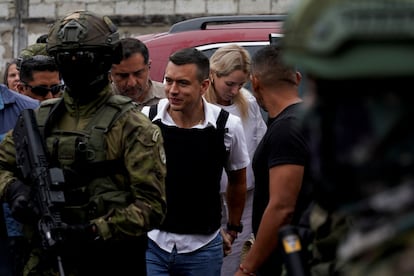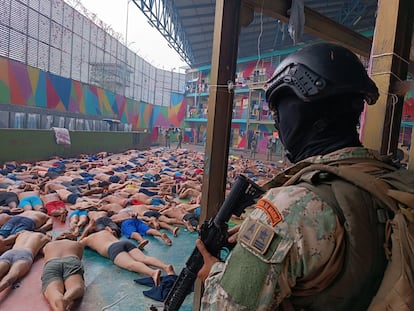Daniel Noboa secretly creates database with genetic profiles of criminals in Ecuador
Three sources told EL PAÍS that officials are taking samples from prisoners, claiming it helps with identification in case of violent death
The government of Daniel Noboa is secretly creating a database of genetic profiles by deceiving prisoners in Ecuador’s prisons, according to three sources to which EL PAÍS has had access. The officials who carry out this task tell the inmates that these DNA samples, which will go to a state information bank, will help them be identified in the event of a massacre, something that happens in penitentiaries in the country; or in the event of identity theft. Prison workers are instructed to convince them not to consult with their lawyer and to make them believe that the procedure is part of normal prison routine. What these officials are concealing from their charges is that the latter have the right by law to refuse to have samples taken from them, and that this genetic information can be used to implicate them in crimes that they committed in the past or that they will perpetrate in the future. Performing this procedure is mandatory for toxicologists, anthropologists, forensic chemists and forensic psychologists.
Noboa, a 36-year-old businessman and son of the country’s richest man, surprisingly won Ecuador’s presidential election in October last year. After taking office in November, he received a country mired in violence and controlled by gangs. Paradoxically, the gangs exercised their power from the prisons, whose cell blocks the authorities did not dare to enter. In January, gang members challenged the State by attacking the set of a television station while it was broadcasting live and sowing panic in the streets of Guayaquil with shootings and kidnappings. Noboa decreed a state of emergency due to “internal armed conflict,” which empowered him to take the army to the streets and turn the gangs into military objectives under the label of terrorism. In just two months, homicides have been reduced by half and the president has announced the creation of two prisons similar to those of Nayib Bukele in El Salvador.

The military have also entered the prisons to try to regain control. The government has taken advantage of this circumstance to begin carrying out genetic registration. In recent weeks, forensic experts have received instructions on how to perform an oral swab. At the Cotopaxi prison, near Quito, which holds 4,346 inmates, only four have refused to undergo the test. In Riobamba, a prison in the Andean mountains, the entire prison population ended up being registered. “You should not read the consent forms to the PPL [persons deprived of liberty], they do not even understand them,” are the instructions that the forensic experts have received, according to three different sources. The National Service for Comprehensive Attention to Adults Deprived of Liberty and Adolescent Offenders (SNAI), the entity in charge of Ecuadorian prisons, declined to answer the questions posed by EL PAÍS.
DNA, indeed, can help identify prisoners in the event that they are murdered in riots, which in Ecuador are of unusual violence: beheadings with knives, dismemberments, burning of corpses. The information that is withheld from inmates is that these records can also be used to involve them in crimes that they are going to commit in the future or that they have already committed in the past. For example, a prisoner convicted of murder who provides his genetic material could have his sample match those that were collected in a rape case. A genetic sample can only be requested by a judge or prosecutor. The percentage of people who agree to provide this information is very low in cases that are settled in court, according to one expert, which is why it is more than suspicious that the government has convinced practically the entire prison population to do so.
According to a source who witnessed the taking of samples this Friday at the Guayaquil regional prison, a police officer received the prisoners and informed them that they had to fill out a form, without explaining anything else. They then went to a table where they were assigned a code and their photograph was taken. They were then taken to another place where police officers entered their data into a computer, followed by a swab that an expert was in charge of storing to respect the chain of custody. None of them raised any objection and anyone who asked was told that the samples were necessary to identify them at some point. “I mean, just in case they dismember us?” said more than one. The answer was yes and the procedure continued.

The Permanent Committee on Human Rights, CDH, which monitors the situation in prisons, was not aware of these proceedings. “The right to health could be violated, that sensitive data must be kept under absolute confidentiality and be consented to, and provided voluntarily,” says Billy Navarrete, its director. “The person should be accompanied or at least advised by their legal representative. The Ministry of Public Health is the only entity that should ethically guarantee access to this highly sensitive information, there is no other delegation here,” he insists.
The government also wants to avoid cases such as that of the criminal Leandro Norero, alias El Patrón, who revealed the incompetence of the authorities. In 2020, Norero, one of the most important drug trafficking bosses, took advantage of the Covid-19 pandemic to declare his death due to the virus and evade the authorities of Peru, where he had an open case. The next time he was located, alive, was in a mansion in Samborondó, a wealthy neighborhood in Guayaquil. He was imprisoned again and on October 2022, in the medium-security cell in Cotopaxi, he died for the second time. El Patrón fell into an ambush organized by the criminal gang Los Lobos, who were his allies and business partners, and who maintain control of the prison. In theory, he was dismembered and then part of his corpse was cremated. However, police suspect it was another ruse. The identification was made with a forensic anthropological study (descriptions of family members, tattoos, scars) and not a genetic profile, because it was not available. Without this biological data authorities cannot be one hundred percent certain that the criminal has died. Identity changes with plastic surgery and faking burials are common tricks of drug lords.
Sign up for our weekly newsletter to get more English-language news coverage from EL PAÍS USA Edition
Tu suscripción se está usando en otro dispositivo
¿Quieres añadir otro usuario a tu suscripción?
Si continúas leyendo en este dispositivo, no se podrá leer en el otro.
FlechaTu suscripción se está usando en otro dispositivo y solo puedes acceder a EL PAÍS desde un dispositivo a la vez.
Si quieres compartir tu cuenta, cambia tu suscripción a la modalidad Premium, así podrás añadir otro usuario. Cada uno accederá con su propia cuenta de email, lo que os permitirá personalizar vuestra experiencia en EL PAÍS.
¿Tienes una suscripción de empresa? Accede aquí para contratar más cuentas.
En el caso de no saber quién está usando tu cuenta, te recomendamos cambiar tu contraseña aquí.
Si decides continuar compartiendo tu cuenta, este mensaje se mostrará en tu dispositivo y en el de la otra persona que está usando tu cuenta de forma indefinida, afectando a tu experiencia de lectura. Puedes consultar aquí los términos y condiciones de la suscripción digital.








































